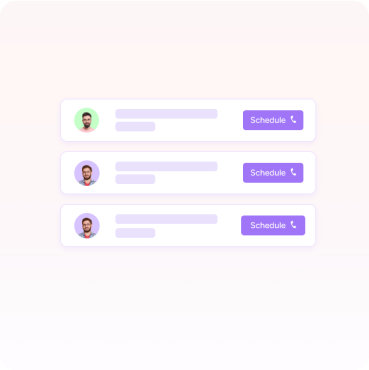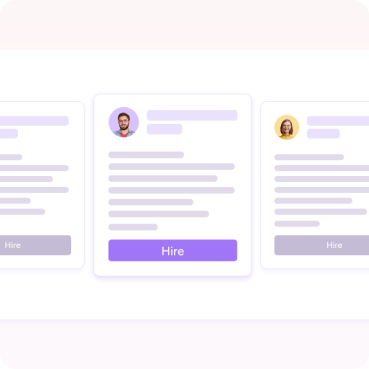Regular hiring
High RiskHire AWS developers of Silicon Valley caliber
Hire pre-vetted full time remote AWS Developer from India. Hire now and build your dream engineering team with Hyno
Join 4,000+ companies already growing








Our Top Remote Developers
Hyno conducts rigorous testing and carefully vets the developers who are fueled by passion and skill sets. Hence, our developer community is the foundation for innovation and collaboration, bringing ideas and projects to fruition.
OUR STANDARDS
Hyno vs. Your regular recruitment process.
Find a risk-free, pre-interviewed, high-quality developer who is remote-ready in less than 2 weeks at 40% less cost.
Parameters
Choose the right for your firm.Time
Fees
Quality
Pre Screening
Remote readiness check
Termination
Failure rate
1 - 4 Months
> $1000
High
Low
Freelancing
High Risk1 - 2 Months
No fee
No
Very high
 Low Risk
Low Risk
0 - 15 Days
No fee
No
Very low
Pricing Starts from $35/hr
Accomplishing everything in just 3 steps
Our technical manager aligns the required skillset and tech stack with our talent pool to help you find the best fit.

Shortlisting candidates
Precise Hiring: Understanding, Gathering, and Shortlisting nittygritty.
-
 We start by thoroughly understanding your unique needs and specifications.
We start by thoroughly understanding your unique needs and specifications.
-
 check markWe
align the developer details with company goals. This way, we tailor the candidate
selection to seamlessly integrate with the organization’s vision and goals.
check markWe
align the developer details with company goals. This way, we tailor the candidate
selection to seamlessly integrate with the organization’s vision and goals.


Scheduling an Interview
Effortless talent selection: Finding your perfect match
-
 We connect you with the chosen candidates to ensure a personalized experience.
We connect you with the chosen candidates to ensure a personalized experience.
-
 Our rigorous
selection process guarantees that you find candidates who align seamlessly with your
requirements.
Our rigorous
selection process guarantees that you find candidates who align seamlessly with your
requirements.


Onboarding the talent
Streamlined onboarding for peak performance.
-
 The selected/qualified talent integrates smoothly through structured onboarding to
quickly adapt to projects, processes, and team dynamics.
The selected/qualified talent integrates smoothly through structured onboarding to
quickly adapt to projects, processes, and team dynamics.
-
 We go beyond
integration to offer ongoing support for a seamless transition to ensure that the
new talent exceeds your expectations.
We go beyond
integration to offer ongoing support for a seamless transition to ensure that the
new talent exceeds your expectations.


Read hiring guide
A one-stop shop to hiring the right AWS Developer
How to hire a AWS developer? Skills to look for, interview questions, and more
Hiring a dedicated developer for your business can
be a cumbersome task. As many companies are competing to hire top AWS
developer, so finding a good developer is not as easy as it may seem.
We're here to assist all employers who choose to hire AWS developer on their
own. Recruiting a developer on your own requires a fair amount of software
development experience in general. However, if you're a non-technical manager
interested in learning more about how to hire a AWS developer, we've put up
an excellent resource for you.
Things to check Key Skills Required for a AWS Developer?
The following are the key skills that a developer should possess to become proficient in AWS:
1. Knowledge of AWS Services: The developer should have a good understanding of the different AWS services, such as EC2, S3, RDS, Lambda, and others. They should know how to use these services to build scalable, reliable, and cost-effective applications.
2. Proficiency in Programming Languages: An AWS developer should be proficient in programming languages such as Python, Java, Ruby, Node.js, or others. This will help them develop and deploy applications on the AWS platform.
3. Experience with DevOps: AWS developers should have experience with DevOps practices, such as continuous integration and continuous deployment. They should also be familiar with tools such as AWS CodePipeline, AWS CodeBuild, and AWS CodeDeploy.
4. Familiarity with Infrastructure as Code (IaC): The developer should have experience with Infrastructure as Code tools like AWS CloudFormation, Terraform, or others. This will enable them to provision and manage infrastructure resources in a consistent and repeatable manner.
5. Security and Compliance: AWS developers should be familiar with AWS security best practices and understand how to implement them in their applications. They should also be familiar with compliance frameworks like HIPAA, PCI DSS, and others.
6. Experience with Serverless Architecture: The developer should have experience with serverless architectures, such as AWS Lambda, AWS API Gateway, and AWS Step Functions. This will help them build and deploy applications that are scalable, cost-effective, and highly available.
7. Knowledge of AWS CLI and SDKs: AWS developers should be familiar with AWS CLI (Command Line Interface) and AWS SDKs (Software Development Kits) for various programming languages. This will help them automate tasks, manage AWS resources, and integrate AWS services into their applications
Ideal Hiring Process for AWS Developer
1. Define the job requirements: Before you start looking for candidates, define the job requirements and responsibilities. This includes the technical skills, experience, and qualifications needed for the job.
2. Post the job opening: Post the job opening on job boards, social media, and other relevant platforms. Be clear about the job requirements, the remote work setup, and the company culture.
3. Screen resumes: Once you receive resumes, screen them for relevant experience, technical skills, and qualifications. Look for candidates who have experience working remotely and are familiar with AWS technologies.
4. Conduct video interviews: Conduct video interviews with the candidates to assess their technical skills, problem-solving abilities, and communication skills. Ask questions that are relevant to the job requirements and responsibilities.
5. Test their skills: Test the candidate's technical skills by giving them a coding challenge or a project to complete. This will help you assess their ability to work with AWS technologies and solve real-world problems.
6. Check references: Check the candidate's references to verify their work history, skills, and qualifications. Ask their previous employers about their work ethics, communication skills, and ability to work remotely.
7. Offer the job: Once you have identified the ideal candidate, make an offer that includes salary, benefits, and any other relevant details. Be clear about the remote work setup and expectations.
8. Onboard the candidate: Onboard the candidate by providing them with the necessary tools, resources, and training. This includes access to AWS accounts, communication tools, and company policies and procedures.
Important Interview questions to ask to Hire a AWS Developer
What AWS services have you worked with, and what are your favorite services to work with?
I have worked with several AWS services, including EC2, S3, RDS, and Lambda. My favorite service to work with is Lambda because it enables me to build highly scalable and cost-effective applications.
How do you ensure the security of applications deployed on AWS?
I follow AWS security best practices, such as using secure passwords, enabling encryption, and limiting access to resources. I also use AWS Identity and Access Management (IAM) to manage user access and permissions.
What is your experience with Infrastructure as Code (IaC) tools such as CloudFormation or Terraform?
I have extensive experience with CloudFormation and Terraform. I use these tools to define and provision infrastructure resources in a consistent and repeatable manner.
How do you manage AWS resources and services programmatically?
I use AWS SDKs and CLI to manage AWS resources and services programmatically. I also use AWS CloudFormation and AWS CDK to automate the provisioning and management of infrastructure resources.
Can you explain how AWS Lambda functions work?
AWS Lambda is a serverless computing service that allows you to run code without provisioning or managing servers. It works by triggering a Lambda function in response to an event, such as an API request or a file upload.
What is your experience with AWS DevOps tools such as CodePipeline, CodeBuild, and CodeDeploy?
I have used CodePipeline, CodeBuild, and CodeDeploy extensively to implement DevOps practices such as continuous integration and continuous deployment. I also use AWS CloudFormation and Terraform to manage infrastructure resources.
How do you ensure high availability and scalability of applications deployed on AWS?
I use AWS services such as Elastic Load Balancing, Auto Scaling, and Amazon RDS to ensure high availability and scalability of applications. I also use serverless architectures such as AWS Lambda to build highly scalable and cost-effective applications.
How do you troubleshoot issues with AWS resources and services?
I use AWS CloudWatch to monitor the health and performance of AWS resources and services. I also use AWS CloudTrail to audit API calls and detect security and compliance issues.
What is your experience with AWS security and compliance frameworks, such as HIPAA or PCI DSS?
I have experience with AWS security and compliance frameworks such as HIPAA and PCI DSS. I follow AWS security best practices and use AWS services such as AWS Config to ensure compliance with these frameworks.
Can you give an example of a complex AWS project you have worked on, and how you approached it?
I worked on a project that involved migrating a large-scale application to AWS. I used AWS CloudFormation and Terraform to provision and manage the infrastructure resources. I also implemented DevOps practices such as continuous integration and continuous deployment to ensure the application was highly available and scalable.
Job Description Template for AWS Developer
Location: [Insert Location]
Job Title: AWS Developer
Position Type: Full-Time
Salary: [Insert Salary Range]
We are looking for a skilled AWS developer to join our team. As an AWS developer, you will be responsible for designing, developing, and deploying cloud-based solutions using AWS technologies.
Key Responsibilities:
- Design, develop, and deploy cloud-based solutions using AWS technologies such as EC2, S3, RDS, Lambda, and CloudFormation.
- Develop serverless applications using AWS Lambda and API Gateway.
- Implement DevOps practices such as continuous integration and continuous deployment using AWS CodePipeline, CodeBuild, and CodeDeploy.
- Ensure the security and compliance of applications deployed on AWS.
- Troubleshoot issues with AWS resources and services using AWS CloudWatch and CloudTrail.
- Collaborate with cross-functional teams to deliver high-quality solutions.
Requirements:
- Minimum of 3 years of experience in AWS development.
- Proficiency in AWS services such as EC2, S3, RDS, Lambda, and CloudFormation.
- Experience in serverless architectures using AWS Lambda and API Gateway.
- Knowledge of DevOps practices such as continuous integration and continuous deployment using AWS CodePipeline, CodeBuild, and CodeDeploy.
- Familiarity with AWS security and compliance frameworks such as HIPAA and PCI DSS.
- Strong problem-solving and communication skills.
- Bachelor’s degree in Computer Science or related field
Preferred qualifications:
- AWS Certified Developer Associate or AWS Certified Solutions Architect Associate certification.
- Experience in other cloud platforms such as Azure or Google Cloud Platform.
If you are an experienced AWS Developer who enjoys working in a fast-paced, challenging environment, we would love to hear from you. Please submit your resume and cover letter for consideration.